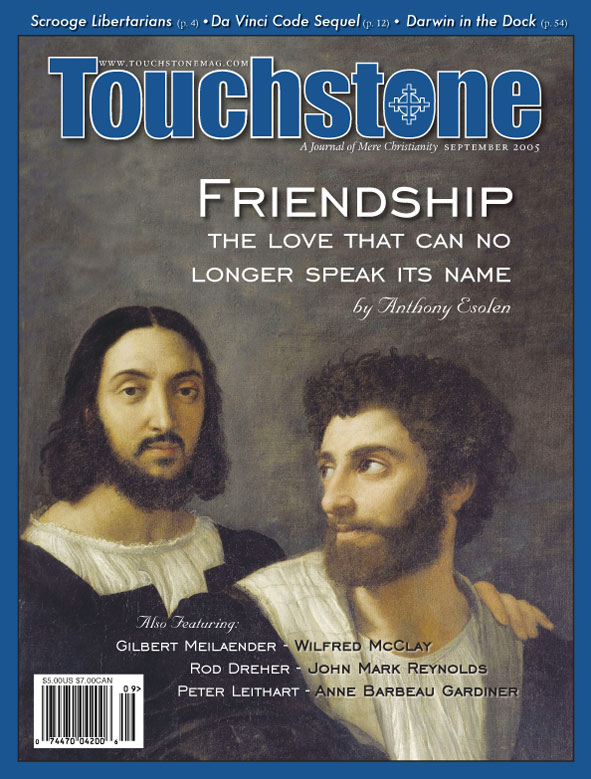Pink Campaign
How the Media Made Homosexuality Mainstream
by Rod Dreher
Most people, when they think of media bias, believe that the news media set out to tell people what to think. I work for a mainstream daily newspaper, and except for a year in which I worked for National Review magazine, have been a newspaperman my entire career, and I must tell you that in my experience, the media—the entertainment media as well as the news media—are rarely that intentional. The bias more often comes in setting the parameters of debate.
Here’s what I mean. Every media product—every newspaper or television report, every movie, every TV show, and so forth—is shaped by choices made by the creators, producers, and editors. Those choices will inevitably reflect the judgment of those creators, not only about what’s right and what’s wrong, but more fundamentally, about what constitutes the range of acceptable opinion.
Humane TV
I’ll give you a positive example of how this works. As a child in a small Southern town in the 1970s, I came up in a culture deeply imbued with racist values. Everything about the local culture reinforced the belief that blacks and whites were to be separate, and that blacks were inferior. Not even church was immune; while I was never taught racist values in Sunday school, nothing we heard there challenged the prevailing racist mentality. Indeed, our Methodist church nearly split in 1980 over the question of allowing black folks to come see a performance there (happily, the racists did not prevail).
The only place—and I mean the only place—to find an alternative view to the racist orthodoxy was on television. It was through TV that I learned how wrong racism was. We never saw our values—that is, racist values—presented on television, except to be harshly criticized. I can remember hearing older people complaining about how TV was undermining our values by showing “race-mixing” and depicting black people in a positive light.
These people were absolutely correct: TV was undermining those values by pipelining in the more humane values of the world outside our little Southern enclave. Today, you can go to my hometown and find it a much more congenial and sensible place in terms of race relations. For that I credit television.
If only it had stopped there. Today you can go to my hometown and also find the same social and familial destruction that has washed over America since the 1960s, most especially the same sexual chaos and resulting family breakdown. My sister, who teaches elementary school in our hometown, told me a couple of years ago that I would scarcely grasp what she deals with in terms of children struggling emotionally, and in turn academically, to hold their lives together amid the instability their parents’ divorces and infidelities have brought into their lives.
My town is the kind of quaint place people escape to from the big city to find a good place to raise their kids. But there is no escaping the values of the media. Most everyone in my town invited them virtually unrestricted into their homes a generation or so ago, and allowed the media a free hand in raising their children. You see the results today, there and everywhere in this country.
Mandated Celebration
Let me give you a particular example of how one phase of the sexual revolution has been advanced in and by the media over the past twenty years. I’m talking about homosexuality.
It is so ubiquitous, in all its manifestations, in our media today that it’s hard to remember a time when it did not receive such extensive and favorable treatment. Let me be clear: I do not long for a time when homosexuality was demonized by the media. But that’s ancient history. Today the media not only celebrate it, but increasingly all but mandate its celebration.
And this conditioning has brought about the desired effect: According to the polls, 10 or 15 years from now, gay marriage will cease to be a controversial issue. The weight of the opposition to it lies in the older end of the demographic spectrum. People 40 and under have no problem with it. The younger you are, the more likely you are to accept it, even if you do not approve of it.
The idea that all moral discernment equals impermissible “passing judgment,” is the single most powerful taboo. Of course, those preachers of the “judge not” gospel do not intend it as a general principle; they only mean for this functional nihilism masquerading as virtue to apply to moral choices having to do with sex and sexuality. The effect has been the near-complete moral disarmament of a generation.
The story of how the media, since the 1960s, have mainstreamed the sexual revolution is an old, familiar one, and it doesn’t bear repeating in detail here. I will say, though, that when I was a film critic, I chose to rent one night the early sixties film Splendor in the Grass, with Natalie Wood and Warren Beatty, because a Baby Boomer friend (and committed sexual revolutionary) told me how much the movie had meant to her when she’d seen it in first run, as a teenager.
Seeing what was for her a landmark film explained so much to me about what had happened to this society. It is to see a new moral order struggling to be born. This movie tells the story of a teenage couple passionately in love with each other, who find their physical and emotional desires thwarted by their parents and the repressive social order in which they live. Their inability to have guilt-free sex leads to tragedy. The moral of the story: Sexual repression is responsible for human misery, and must be fought at every turn if we are to be free and happy.
Corrupted Standards
The people who went on to make the movies, the television shows, the music, and the news products that have taught America from the 1960s forward how to think about sex and sexuality agree with this view, and have championed it at every turn—and business people, who may or may not be personally conservative, have not hesitated to co-opt the message of sexual liberation to sell their products. The revolution was everywhere, and we did not resist it.
I learned a valuable lesson after church one day in the seventies, when ABC aired a then-controversial sitcom called Soap, the most controversial element of which was the existence of a homosexual character. The pastor had delivered a sermon denouncing the program, and he urged the congregants to write to the local ABC affiliate to protest.
“Pastor is so right, that show is garbage,” my mother and a friend agreed, discussing the sermon on the sidewalk after services. They went on to say that they didn’t much approve of that racy new show that came on before Soap, the one that showed a guy pretending to be gay so he could share an apartment with two girls and not upset his stodgy landlord. You know, Three’s Company.
Listening to my mom say these things, I thought: Isn’t that something; we watch both programs in our house. Every week. My parents started out not letting me watch Soap, but eventually they gave in to my nagging, and I became a regular viewer, too. The point is not to crack on my parents, but to say that I learned a valuable lesson about adult hypocrisy—they were just as curious about Soap as anybody—and weakness in the face of cultural pressure.
My mom and dad were, and are, moral conservatives. But like most Americans, they wanted to be entertained, and they weren’t savvy enough to understand how their own standards, and the standards of their children, were being corrupted by the entertainment media they so indiscriminately let into the house.
Media Victims
What does this have to do with the mainstreaming of homosexuality? If we are to accept that the unrestricted fulfillment of sexual desire is not only moral, but necessary to health and happiness, then we have no grounds for denying the same to those whose sexual desire has as its object members of the same sex. It only stands to reason.
You might have thought that the advent of AIDS in the 1980s would have sobered up our culture about promiscuity in general, and specifically about its key role in male homosexual identity. But a funny thing happened: In the media, AIDS carriers became identified solely as victims—victims of cruel fate and a repressive society. In San Francisco, public health officials who tried to close the bathhouses were excoriated by many gays and gay leaders for what they called homophobia.
More importantly for the wider culture, the message went out through the media that promiscuous gays who contracted AIDS were not to blame for their predicament—which is no more true than to say that a two-pack-a-day smoker is not responsible for his emphysema. We have no problem blaming the smoker, and no problem stigmatizing the behavior without treating the emphysema sufferer as a pariah. But with AIDS, it was different. The myth of homosexual innocence was consciously and stringently propagated by the news and entertainment media.
This is not, I must stress, to say that those who suffered from the ravages of AIDS deserved anything less than Christian compassion. I am not talking about a missed opportunity to demonize sick men; I am talking about the politicization of a deadly disease, at the expense of truth telling. In the 1980s and early 1990s, journalists in newsrooms talked openly, and without any evident self-awareness, about how we had to keep the focus on heterosexual vulnerability to AIDS, because of the persecution gays would surely come under if the public were allowed to think otherwise.
Remember what I said about how the most important way the media influence public opinion is by setting the terms of the debate? That’s a prime example.
In the early 1990s, I was a television critic for the Washington Times. One of the biggest television stories in either 1992 or 1993 was the debut of Matt, an openly gay character on the Fox nighttime soap Melrose Place. There was real controversy over this, as hard as it is to believe today. But the producers made Matt into a veritable saint, and audiences got comfortable with him.
By the end of the decade, movies like My Best Friend’s Wedding and the Oscar-winning American Beauty were routinely depicting open gays in uniformly positive roles. This is an improvement over films of a generation or so ago that may have depicted gays with uniform negativity, but propaganda for the sake of what its makers believe is a good cause is still propaganda.
TV’s Embrace
More importantly, television embraced the gay revolution. We all remember the national angst over Ellen DeGeneres coming out on her sitcom. Do you recall the Time magazine cover story, featuring a smiling Ellen and the headline “Yep, I’m Gay”? The news media hyped what the entertainment media was doing. We got Will and Grace, which not only presented homosexuality as no big deal, but featured characters making jokes about their sex lives that, as commentator Jonah Goldberg pointed out, would not have been allowed to come out of the mouths of heterosexual characters ten years earlier.
The news media have been increasingly bold about banging the drum for gay “marriage.” Last summer ABC’s Primetime Live broadcast a phenomenally well-done report that was one of the most astonishing pieces of propaganda I have ever seen. Diane Sawyer reported on a sweet gay male couple living in Tennessee, I believe it was, and struggling for tolerance among the bigoted locals.
At one point, the couple decided they wanted to have a child, and contracted with a single female friend to bear their baby. Diane showed how the gay couple pampered the woman through her pregnancy, and the correspondent even made the point that heterosexual husbands wouldn’t treat their pregnant wives so poshly. Well, the baby came—I seem to recall that there were two babies, actually—and the gay couple found that taking care of babies was in fact difficult. Children are not Shih Tzus, after all. The strain on their relationship was too much to bear, and the happy homosexuals broke up.
You’d think this was a cautionary tale, but no: Diane presented it with a c’est la vie shrug. Hey, that’s life! When it was over, I looked at my wife and said, “That’s how they do it, isn’t it? That’s how they get us to accept this kind of thing.”
Here’s something from a Philadelphia Inquirer article in 2003, celebrating the “dizzying” pace of change for gays in popular culture:
Michael Wilke, who advises corporations about how to advertise in the gay community, lauds this kind of programming (including Queer as Folk, Will and Grace, and Boy Meets Boy). He said, “It gives straight viewers a chance to make friends with gays in their living rooms. It’s like sensitivity training.”
Robert Thompson, an expert in popular culture at Syracuse University, said, “This is the genius of television. Gay characters are a hot genre, the shows have a cumulative power, and they end up moving the center of public opinion.”
That’s the power of the media at work. On the issue of homosexuality, all branches of the media mutually reinforce the message of acceptance, and consciously work to marginalize any negative judgment of homosexuality, even when it regards behavior that some homosexual people find indefensible. Again, this is the propagandistic instinct at work, and it is condescending to the full humanity of homosexual men and women when the media ignore or downplay unpleasant or inconvenient facts.
This is, by the way, why you have seen little, if any, reference in the mainstream media to the role male homosexual culture played in the Catholic sex-abuse scandal. Mainstream journalists are making conscious decisions to ignore it. When I arrived in Dallas in the summer of 2002 to cover the historic meeting of the Catholic bishops for National Review, I was asked to brief a correspondent for Fox News who had been put onto the story at the last minute.
When I got to the part about the role of male homosexuality in Catholic clerical culture, I told her she needed to speak to Michael S. Rose, who was at the conference, and whose terrific new book Goodbye, Good Men was an important exposé of the so-called lavender mafia. The reporter shook her head and said the crew had orders from New York, from the top of the company, not to talk to him, and to stay off the homosexual thing.
Moral Spinning
If Fox News, supposedly the conservative favorite, is spinning the news like that, what hope do you have that ABC, NBC, CBS, CNN, The New York Times, and other agenda-setting news media will be honest?
The thing to keep in mind is that the overwhelming number of journalists believe they are doing the moral thing, that they are warriors in a civil rights struggle every bit as important and necessary as the struggle for black civil rights a generation ago. They are certain they have right on their side, and they are no more committed to fairness to the moral traditionalist point of view than they would have been to giving George Wallace and Orval Faubus equal time.
Let me be perfectly clear: I do not want to go back to a time in which homosexuals were demonized in media coverage. I have gay friends, and they are men and women of admirable personal integrity, and in one case that comes to mind, genuine moral heroism in the face of adversity. But media unfairness to gay men and women in the past does not justify its unfairness to social conservatives today. The line the mass media have chosen to follow is: Innocent gays are fighting for their rights against bigoted Christians and their Republican allies. There is no chance at all that the media will allow anything to interfere with this narrative. None whatsoever.
The journalist Terry Mattingly has what he calls the Golden Rule of contemporary American media: “The religious right must lose.” And we religious conservatives are losing the culture war, badly, on the playing fields of prime time. Just over a decade from the moment when Fox tentatively stepped forward with an openly gay character in prime time, homosexuality is at the white-hot center of our popular culture.
For example: Queer Eye for the Straight Guy and its like, domestic-partner benefits at Wal-Mart, gay couples featured in TV advertising, gay wedding announcements in mainstream newspapers, a gay Episcopal bishop, the Massachusetts Supreme Court legalizing gay “marriage” by judicial fiat, and, most fateful of all, the US Supreme Court decriminalizing sodomy on the principle that—this is absolutely crucial— it is unconstitutional for the state to prohibit private consensual sexual acts between adults. We now find that one of the philosophical pillars of the sexual revolution has been read into the Constitution by a Supreme Court, seven of whose members were appointed by Republican presidents.
We are losing the gay marriage fight, and, in fact, have lost it already, though not all of us know it yet. When the acceptance of civil-unions protection for gay couples is the conservative position, then we have been defeated. If we cannot muster enough votes in Congress to affirm a Constitutional amendment defining marriage as between a man and a woman—indeed, if the very assertion that marriage, properly understood, is between one man and one woman is considered a matter of great controversy—then, plain and simple, it’s over.
Rod Dreher is a contributing editor to Touchstone. He is a writer and blogger and the author of several books, including The Benedict Option (2017) and Live Not by Lies: A Manual for Christian Dissidents (2020).
subscription options
Order
Print/Online Subscription

Get six issues (one year) of Touchstone PLUS full online access including pdf downloads for only $39.95. That's only $3.34 per month!
Order
Online Only
Subscription

Get a one-year full-access subscription to the Touchstone online archives for only $19.95. That's only $1.66 per month!
bulk subscriptions
Order Touchstone subscriptions in bulk and save $10 per sub! Each subscription includes 6 issues of Touchstone plus full online access to touchstonemag.com—including archives, videos, and pdf downloads of recent issues for only $29.95 each! Great for churches or study groups.
Transactions will be processed on a secure server.
more on sex from the online archives

28.2—March/April 2015
Man, Woman & the Mystery of Christ
An Evangelical Protestant Perspective by Russell D. Moore
more from the online archives
calling all readers
Please Donate
"There are magazines worth reading but few worth saving . . . Touchstone is just such a magazine."
—Alice von Hildebrand
"Here we do not concede one square millimeter of territory to falsehood, folly, contemporary sentimentality, or fashion. We speak the truth, and let God be our judge. . . . Touchstone is the one committedly Christian conservative journal."
—Anthony Esolen, Touchstone senior editor












